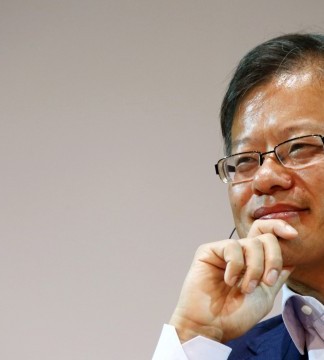Crypto giant Binance tries to woo France by bolstering blockchain start-ups

Binance, the world’s biggest cryptocurrency exchange, has set its sights on France and announced it will help develop Web3 and blockchain projects in Paris.
Binance boss Changpeng Zhao, nicknamed “CZ”, said at the Paris Blockchain Week Summit event on Wednesday that France can become the Web3 and cryptocurrency leader of the future.
“I think France has one of the most progressive and open-minded governments that could help in developing pro-crypto regulations,” Zhao said, adding that the country is uniquely positioned in terms of regulation and talent.
Zhao announced the Chinese company would help build Web3 and blockchain projects at Station F, the Parisian start-up incubator, as part of a €100 million injection into France, in an initiative dubbed Objective Moon.
There will also be new Binance offices in Paris, which will support early-stage start-ups, in areas like blockchain, Web3 and the metaverse. The start-ups that are selected will be hosted at Station F for free and could benefit from Binance subsidiaries.
Binance has long seen the potential in France, and in November it opened an office in Montrouge, a southern suburb of Paris, hiring 20 employees.
Binance now hopes to recruit 100 more employees by the end of the year, at new offices in central Paris.
Europe tries to regulate crypto
But Binance has had a turbulent year with regulators around the world.
It was banned by Britain’s watchdog, the Financial Conduct Authority, over concern about a deal Binance struck with the payments provider Paysafe.
Binance was also investigated last year by the US Commodity Futures Trading Commission over possible insider trading.
The European Union too is grappling with how to regulate cryptocurrencies. Earlier this month, the European Parliament voted in favour of new traceability rules for crypto asset providers requiring them to collect information on the holders they interact with.
Crypto companies would also have to report transactions over €1,000 to anti-money laundering authorities.
The proposed rules have sparked concern among cryptocurrency owners, who worry about the implications for their privacy.
For the rules to come into force, they will first have to go through negotiations between the EU Parliament, Council and Commission, which are due to start later in April.
Despite the heightened scrutiny, Zhao said the approach by regulators had changed over the years.
“We have seen a great shift of attitude towards crypto over the past year. Until last year, regulators were talking in a negative way, while many regulators today approach us with a positive note,” he said on Wednesday.






























